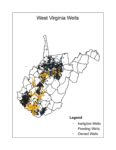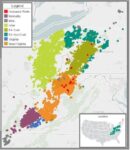 |
|
||||
| As we anticipated, some bad bills that aid drillers at the expense of West Virginia landowners — bills that were either soundly defeated or stalled a different points in the legislative process in 2016 — are starting to reemerge this session.
“Right to Trespass” for Survey Access The pipeline companies had been relying on and citing West Virginia’s eminent domain statute saying it gave them survey access before an eminent domain proceeding has been initiated. That statute says eminent domain can only be for a “public purpose”. In the Monroe County case, the judge ruled that the Mountain Valley pipeline was not for a public purpose and therefore the pipeline company didn’t have a right to survey people’s land without their permission. This “right to trespass” bill, which has been reintroduced as SB 245, gives pipeline companies who have made application and been assigned a docket number by FERC the right to enter for survey activities. Re-branded Forced Pooling (AKA Joint Development) The first part of SB 244 is last year’s (simple) majority rules bill, which would allow tracts for which the driller has leases from only a majority of the heirs to be pooled into units and drilled. It is unclear how the unsigned mineral owner would be paid and whether the surface could be used. So if your cousins sign a lease and you hold out because your cousins signed bad leases, or because you don’t want your surface used for a well pad, you will, it appears, be stuck with your cousins’ lease. For years, SORO has advised surface owners to buy an interest in the minerals under their property if they want to have a say in how the minerals and their surface property are developed. Our biggest concern with SB 244, is that there are many surface owners who only control a small portion of the minerals under their property. Under SB 244, the wishes of those surface owners could be ignored if a little more than 50 percent of their co-owners in the mineral tract make a deal with the gas company. SB 244 would largely eliminate any leverage surface owners with partial ownership of the minerals have in negotiations with gas companies. The second part of the bill is last year’s “invisible ink” bill, or what the industry referred to as “lease integration”. Currently, a pooling provision or amendment is needed in a lease to authorize the driller to develop multiple mineral tracts using a single horizontal well bore. And a pooling provision or amendment is needed to state how the royalty from the well or wells on the pooled tracts will be distributed. If there is already an old lease that does not have a pooling provision, the drillers want a modernizing amendment to allow pooling, without modernizing the royalty from 12.5% to 18% or more. SB 244 takes away a mineral owner’s ability to negotiate an amendment with modern terms and compensation, or a “no surface use” provision, in exchange for signing. We call this the “invisible ink” bill because it assumes that leases have pooling provisions even if there isn’t one. This bill would allow a surface owner’s land to be used for one of those monster pads for horizontal drilling even if there was a “no surface use” lease. The bill says, “The operator’s use of any surface tract overlying the jointly developed leases shall be permissible for that joint development.” Simply put, “joint development” is re-branded forced pooling with only the things that are good for the drillers, and nothing for anyone else — no due process or compensation, no surface protections and no recourse against the driller. In 2016, the “right to trespass” bill was soundly defeated on the Senate floor, with only 11 Senators voting in favor and 23 opposed, and joint development didn’t get out of committee. This success was largely a result of citizens expressing their outrage and making their voices heard. Please contact your Senators and urge them to reject these ill-conceived proposals once again. You can also sign this landowner rights petition from our friends at Save Monroe. The petition will be presented to West Virginia lawmakers in both Charleston and Washington, DC. Click here for more on other zombie bills we might see this session. |
|||||
|
West Virginia Surface Owners’ Rights Organization |
|||||
WV Surface Owners' Rights Organization © 2016
Frontier Theme










